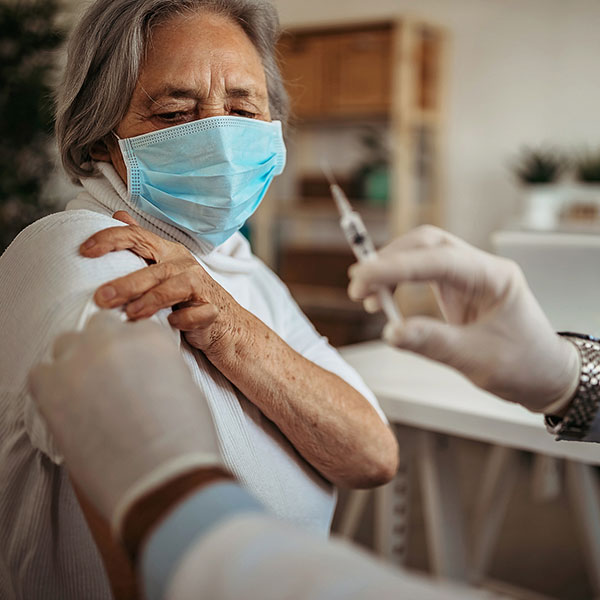Health Connection Fast Facts: The COVID-19 mRNA Vaccines: What You Should Know
The COVID-19 mRNA Vaccine: How Does It Work?
The COVID-19 mRNA vaccines may have been developed at a faster rate than other vaccines in the past, but that’s due to readiness and resources, and to scientific development and scientific engagement early on. Both vaccines currently available underwent rigorous testing and were tested on a large sample group of over 70,000 people.
Both COVID-19 vaccines are administered as a shot into the upper arm/shoulder muscle and they both work the same way, by way of “messenger RNA (mRNA)”.
What is mRNA?
mRNA is most easily described as ‘instructions for your body’s cells’. mRNA molecules are how your cells bring information from their DNA inside the cell’s nucleus to the rest of the cell so that proteins can be made. In the case of the COVID-19 mRNA vaccine, a particular mRNA is injected into the upper arm. HSS Physician Dr. Andy Miller says that “this mRNA is coated in an oily layer - a little bit like an M&M is coated in candy.” The injected mRNA contains instructions on how to make a piece of the ‘spike protein’.”
The spike protein that gets made from the mRNA vaccines’ ‘instructions’ is only a single piece of the virus; it is not the virus itself. The spike protein is just a molecule and it cannot replicate. So the spike protein itself, as well as the actual COVID-19 vaccine, cannot cause a COVID-19 infection.
The immune system, noticing the spike protein molecule, reacts to it. It is that immune response, the immune system’s exposure and reaction to the spike protein, that builds immunity to the COVID-19 virus and keeps you from getting infected.
Efficacy
What we now know for sure is that both vaccines available work extremely well at preventing us from getting ill with COVID-19. To be clear, it is still possible that some people may become infected with COVID-19 after being vaccinated, but it is unlikely that you would get very ill (or have symptoms at all) from the virus. Data from the vaccine trials show that the vaccines available today are about 95% effective at preventing COVID-19 illness.
Potential Side Effects
The injection itself is fairly painless, similar to getting any other vaccination. Some people experience mild side effects after receiving the vaccine, and some feel completely fine. Either way, rest assured the vaccine is working. Common side effects one can expect after receiving the vaccine include:
- Pain at injection site
- Injection site swelling or redness
- Tiredness
- Headache
- Fever and chills in about 1 in 5 people
- Nausea
- Enlarged lymph nodes

How do I Manage Side Effects?
If you experience mild side effects after receiving the vaccine, it is generally recommended to take Tylenol or Motrin to help with a sore arm or fever. However, it is not recommended that you take anything before the vaccination appointment as it is not fully understood how these medications interact with the COVID-19 vaccine.
Who Should Consult with a Physician?
There are groups that should discuss the vaccine with a physician before receiving the COVID-19 vaccine. Groups that should talk with their doctor beforehand include:
- Those who are immunocompromised. It is still important to get the vaccine, as this group is most likely to get very sick if infected with COVID-19.
- Those who are on immunosuppressive medications, i.e., Humira. There is still research to be done as to strength of the body’s immune response to the vaccine. Because we know that people on biologic therapies have a lower immune response to some other vaccines, it won’t be surprising if we notice the same about people on Humira and related medicines. But we don’t know yet.
- Those who are pregnant, nursing, or planning on getting pregnant. Most doctors and U.S. organizations think the benefits of vaccination still outweigh the risks, but we advise discussing with your doctor before vaccination.
- Those who are allergic to any ingredient in an mRNA COVID-19 vaccine.
- Those who have had a severe allergic reaction to the first dose of an mRNA COVID-19 vaccine.
- Those who have a history of severe allergic reactions, i.e. anaphylactic shock.
Additionally, there are groups with health concerns who should talk with their doctor before vaccination, as the CDC has advised:
- If you had COVID-19 or received COVID-19 antibody therapy in the last 90 days.
- If you have a serious bleeding disorder.
- If you have a history of severe allergic reactions to other vaccines, talk with your doctor.
A vaccine is not yet available (at the date of publication) for children under the age of 16 years (Moderna is limited to 18 years and older, Pfizer 16 years and older).
The Virus and the Vaccine
If you have had a COVID-19 infection in the last 90 days (3 months), it is recommended that you talk with your physician about the recommended timing to receive the vaccine. We are starting to learn that natural immunity varies widely in terms of length of time it lasts and levels of immunity. Additionally, it is possible to get COVID-19 more than once, so it is still important that you get vaccinated even if you have had COVID-19 before.
It is not necessary to get tested for the COVID-19 virus before receiving the vaccine (unless you suspect that you currently have a COVID-19 infection). The vaccine has shown to be effective regardless of whether or not you’ve had COVID-19 before.
Along the same lines, it is also not recommended to get tested for antibodies to assess immunity after receiving the COVID-19 vaccine.
Life After Vaccination and Important Guidelines for Safety
While we are still learning exactly how effective these vaccines are at preventing the spread of COVID-19, early data is showing that the vaccines likely help to reduce transmission of the virus. Read on to learn about what to expect once you are fully vaccinated (you are considered fully vaccinated 2 weeks after your second dose of a 2-dose vaccine or 2 weeks after a single-dose vaccine), up to date with the latest CDC guidelines (at the date of publication).
Fully vaccinated people can:
- Visit indoors with other fully vaccinated people without wearing a mask
- Visit indoors with other unvaccinated people from one other household without wearing a mask (unless anyone in that household has an increased risk for severe illness from COVID-19)
Important guidelines to continue following even if fully vaccinated:
- When you are in public or visiting with unvaccinated people from more than one household: wear a mask, stay 6 feet apart from others, and avoid poorly ventilated spaces
- Avoid large gatherings
- Postpone domestic and international traveling
The COVID-19 vaccines have been thoroughly tested and have already been administered to over 70 million people in the U.S. It is encouraged that everyone who is eligible to get the vaccine does so promptly, keeping in mind those who should consult with a physician before vaccination (listed above).
For the most accurate and up-to-date information about the COVID-19 vaccines, please reference the CDC site here: https://www.cdc.gov/coronavirus/2019-ncov/vaccines/index.html
This article was published on March 24, 2021
For more information, please contact us at communityed@hss.edu.
Subscribe to receive Community Education & Outreach emails
Back to Health Connection

